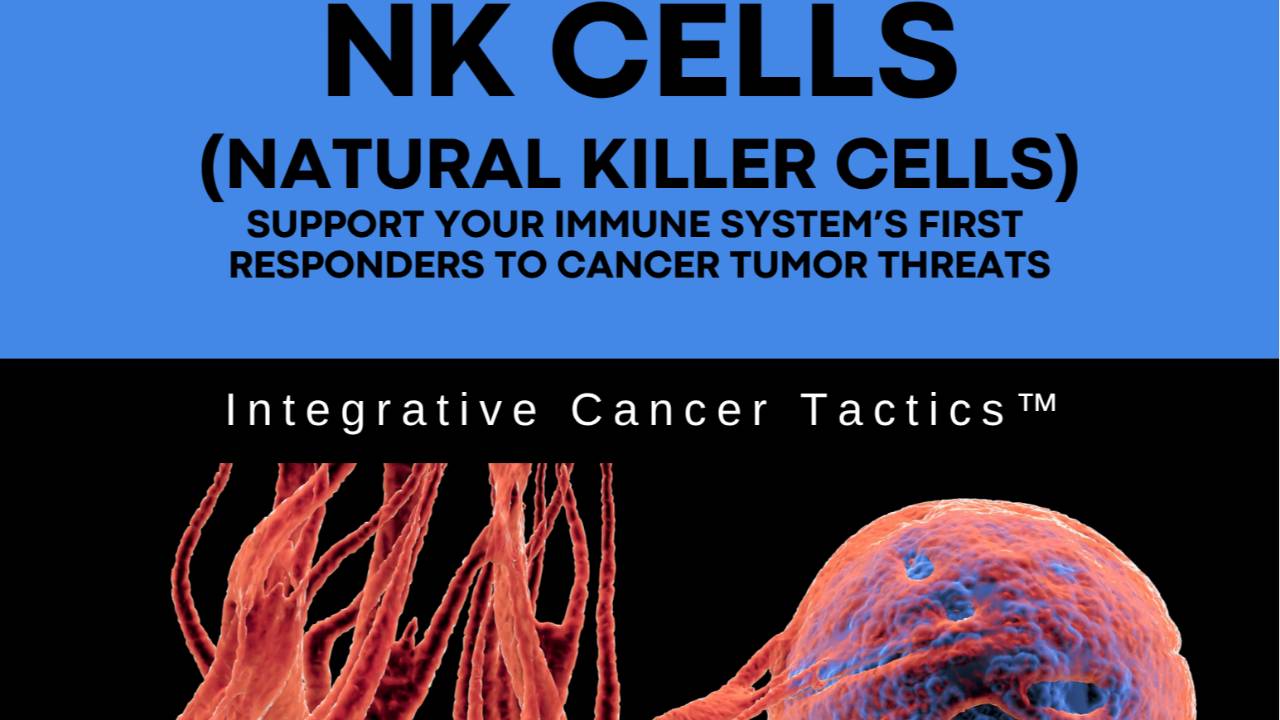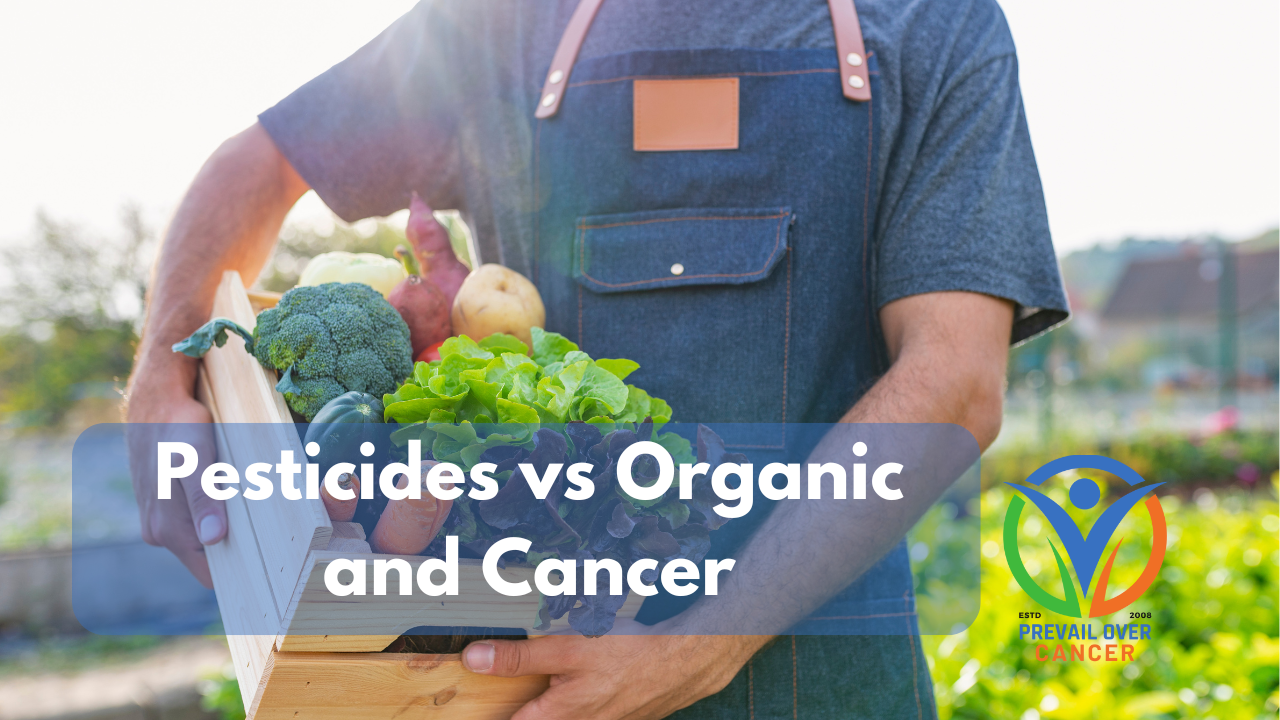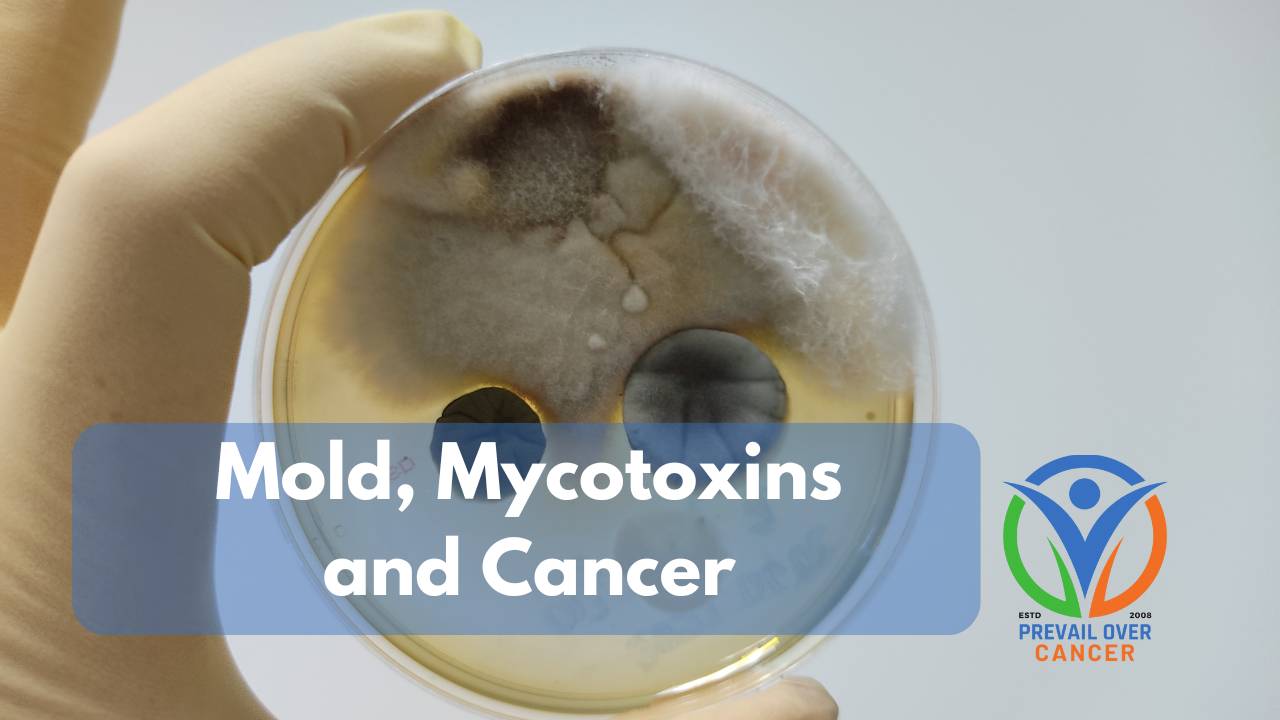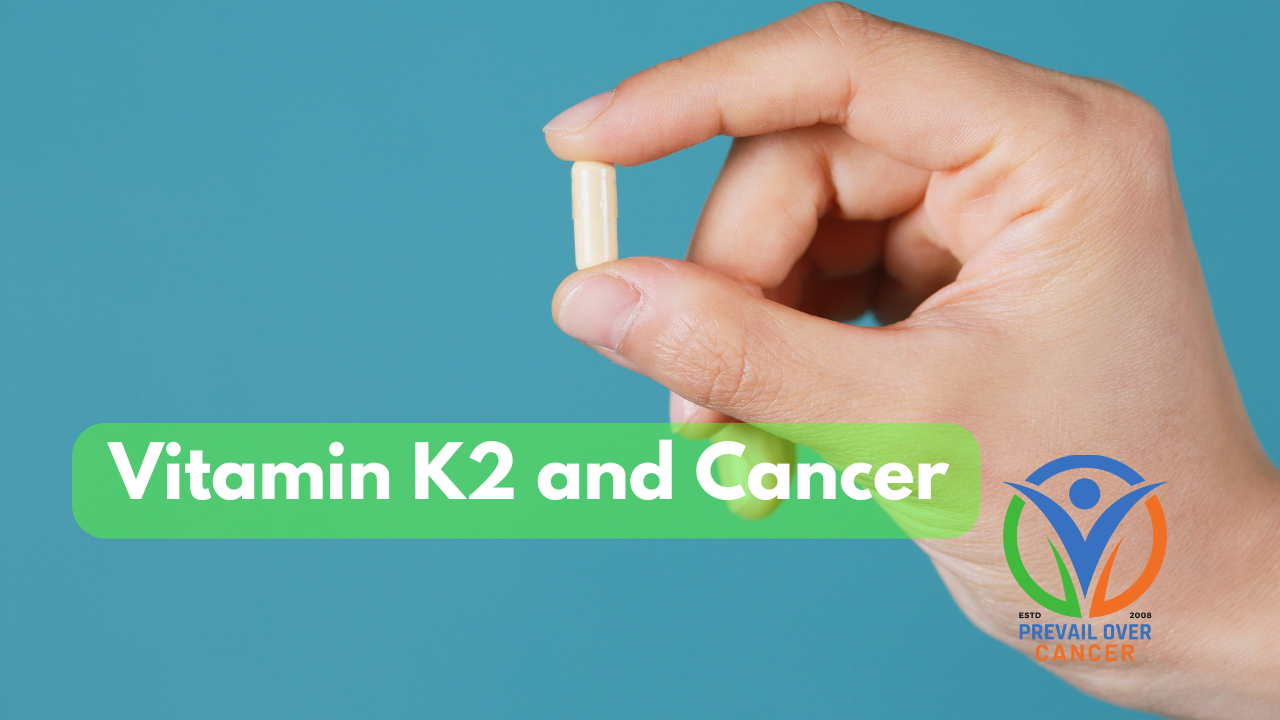Enhancing Your NK Cell Activity Against Cancer

Improving Your Natural Killer (NK) Cell Function:
Your Immune System's Frontline Warriors Against Cancer
Researched and written by Keith Bishop, Clinical Nutritionist, Cancer Coach, Retired Pharmacist, and founder of Prevail Over Cancer.
Natural Killer (NK) cells are a vital component of our innate immune system, acting as the body's first line of defense against cancerous and virally infected cells.[i] Unlike other immune cells, NK cells can recognize and eliminate abnormal cells without prior sensitization, making them crucial in the early detection and control of tumors.[ii]
Natural Killer (NK) cells are a special kind of white blood cell that belongs to a group called lymphocytes, which help defend your body. They make up about 5–15% of your lymphocytes in the bloodstream[iii]. Unlike other immune cells like T cells and B cells, which need to “learn” what to attack, NK cells are part of your body’s fast-acting, built-in defense system. They can quickly recognize and attack vi...
Organic vs. Conventional Produce: Cancer Risk, Pesticide Exposure, and the Fight for Transparency

Exploring the Science Behind Organic Foods, Farmworker Health and Cancer Risks, and the Controversial Congressional Bill Shielding Pesticide Manufacturers
Researched and written by Keith Bishop, Clinical Nutritionist, Cancer Coach, Retired Pharmacist and Founder of Prevail Over Cancer.
As cancer rates continue to rise across the U.S., especially in agricultural states like Iowa, many are asking: could the food we eat—and how it’s grown—be part of the problem?
🚜 Conventional Produce and Pesticide Exposure
Conventional fruits and vegetables are often grown with synthetic pesticides and herbicides, including glyphosate, malathion, and chlorpyrifos—chemicals classified as probable or possible human carcinogens by the International Agency for Research on Cancer (IARC). While regulatory agencies like the EPA set limits on residue levels, recent studies suggest that even low-level, chronic exposure may contribute to cancer risk.
📍 Who’s Most at Risk?
- Farmworkers and pesticide applicat...
Monk Fruit Sweetener and Cancer
From Monastery Remedy to Modern Research: How Monk Fruit Is Sweetening the Fight Against Cancer
Researched and written by Keith Bishop, Clinical Nutritionist, Cancer Coach, Retired Pharmacist, and Founder of Prevail Over Cancer
The Sweet Origin Story of Monk Fruit
Monk fruit, also known as Luo Han Guo, comes from a vine native to China’s Guangxi province. Buddhist monks first cultivated it over 200 years ago to sweeten herbal brews and soothe coughs. The fruit owes its intense sweetness to mogrosides—triterpene glycosides 200–350 times sweeter than sucrose—and is recognized as safe by the FDA.[1]
How Monk Fruit Keeps Blood Sugar in Check
Early animal studies indicate that mogroside-rich extracts may help lower fasting blood glucose levels, enhance insulin secretion, and reduce oxidative stress in diabetic mice.[2]
Human trials echo these benefits: participants consuming monk fruit extract experienced 10–18% smaller post-meal glucose spikes and 12–22% lower insulin responses...
Dandelion Root and Cancer: What Science Says
Dandelions may be the most underestimated plant in your backyard. While often dismissed as weeds, their roots have been studied for surprising anticancer properties. Let’s delve into what the research reveals, how to use dandelion root safely, and what to be aware of if you're undergoing cancer treatment.
Anticancer Actions of Dandelion Root
Dandelion root extract (DRE) contains bioactive compouP%$nds like taraxasterol, chlorogenic acid, luteolin, and sesquiterpene lactones. These compounds have shown the ability to:
Mold, Mycotoxins, Liver Damage and Cancer Risk

Researched and written by Keith Bishop, Clinical Nutritionist, Cancer Coach, Retired Pharmacist, and Founder of Prevail Over Cancer.
Mold and fungus are more than just household nuisances — they may pose serious health risks, including contributing to cancer development. While not all mold exposure leads to disease, particular species produce mycotoxins, toxic compounds that have been linked to liver, kidney, and esophageal cancers. This Prevail Over Cancer blog post examines the science behind mold-related health risks, provides guidance on testing your environment and body, and offers actionable strategies to minimize exposure.
⚠️ Health Concerns Linked to Mold and Mycotoxins
Mold exposure can trigger:
- Respiratory issues: Asthma, sinusitis, chronic cough
- Neurological symptoms: Brain fog, memory loss, dizziness
- Immune dysfunction: Autoimmunity, frequent infections
- Hormonal imbalances: Fatigue, irregular cycles, blood sugar swings
- Skin i...
Oyster Mushrooms and Cancer
Oyster Mushrooms are A Functional Food Ally in the Fight Against Cancer
Researched and written by Keith Bishop, Clinical Nutritionist, Cancer Coach, Author, and Retired Pharmacist
When it comes to integrative cancer care, nature offers some remarkable tools, and one of the most promising is the oyster mushroom (Pleurotus ostreatus). More than just a savory culinary ingredient, oyster mushrooms are gaining traction in peer-reviewed studies for their anticancer, antioxidant, and immune-enhancing properties.
What Makes Oyster Mushrooms Unique?
Oyster mushrooms are rich in:
- β-glucans – immune-modulating polysaccharides[i]
- Ergothioneine – a potent antioxidant that accumulates in tissues under oxidative stress[ii]
- Phenolic compounds, lectins, and terpenoids – with documented anti-inflammatory and anticancer activity. Yes! Lectins have anticancer activity![iii]
Together, these bioactive molecules contribute to:
- Inhibiting tumor cell proliferation[iv]
- Enhancing the activity of ...
Red Light Therapy and Cancer: What the Science Really Says
Explore the research behind red light therapy, photobiomodulation (PBM), and near-infrared light (NIR), and their potential roles in cancer care—from pain relief to mitochondrial support.
Researched and written by Keith Bishop, Clinical Nutritionist, Cancer Coach, and Retired Pharmacist, and Founder of Prevail Over Cancer and Prevail Protocol
Introduction: What is Red Light Therapy?
Red light therapy (RLT), also known as Photobiomodulation (PBM) and Photodynamic Therapy (PDT), is a non-invasive treatment that uses low-wavelength red light or near-infrared light to stimulate cellular function. It’s gaining traction for its potential to support skin health, reduce inflammation, promote tissue repair, and alleviate neuropathy symptoms.[i]
RLT targets the mitochondria, the energy-producing centers of cells. When exposed to specific wavelengths (typically 600–850 nm), mitochondria absorb the light, stimulate mitochondrial cytochrome c oxidase, and produce more ATP (adenosine triphosphat...
Vitamin K2 and Cancer

Vitamin K2: A Powerful Ally in Cancer Prevention and Treatment
Researched and written by Keith Bishop, Clinical Nutritionist, Cancer Coach, and Retired Pharmacist
Vitamin K2 has been gaining attention for its potential role in cancer prevention and treatment. Research suggests that it may help regulate cell growth, induce apoptosis (programmed cell death), and enhance the effectiveness of conventional cancer therapies. In this blog post, we’ll explore the science behind Vitamin K2’s anti-cancer properties, its other health benefits, food and supplement sources, potential side effects, and interactions with cancer treatments.
What is Vitamin K2?
Vitamin K2 is a fat-soluble vitamin that plays a crucial role in calcium metabolism, cardiovascular health, and bone strength. It exists in several forms, including menaquinone-4 (MK-4) and menaquinone-7 (MK-7), which are the most studied for their health benefits.
MK-4 and MK-7 are both forms of Vitamin K2, but they differ in their b...
Methylene Blue: A Guide for People with Cancer
Methylene Blue: A Guide for People with Cancer
What is Methylene Blue?
Methylene Blue (MB), also known as methylthionine chloride, is a synthetic compound initially developed as a dye but later discovered to have various medical applications. It has been used in cancer therapy to treat methemoglobinemia and neurodegenerative diseases and as a cancer treatment photosensitizer.[i]
Where Does Methylene Blue Come From?
Methylene Blue was first synthesized in the late 19th century and has been widely used in medical and scientific research. It is derived from phenothiazine and exists in oxidized (blue) and reduced (colorless) forms.
Anticancer Activity of Methylene Blue
Recent studies suggest that Methylene Blue has potential anticancer properties.
Oral Use of Methylene Blue for Cancer
Methylene Blue has been investigated for its oral application in cancer treatment, particularly in managing painful oral mucositis caused by chemotherapy and radiation therapy. Some studies s...
The Anticancer Potential of Turkey Tail / Coriolus Versicolor Mushroom
Researched and written by Keith Bishop, Clinical Nutritionist, Cancer Coach, and Retired Pharmacist
Coriolus versicolor, or Turkey Tail, is a medicinal mushroom extensively studied for its potential anticancer properties. Used in traditional Chinese medicine for centuries, modern research has uncovered its ability to support immune function and complement conventional cancer treatments.
Alternative Names: Trametes versicolor, Polyporus versicolor, Polystictus versicolor, multicolored polypore mushroom
Common Names and Ingredients: PSK (protein-bound polysaccharide), PSP, VPS, Turkey Tail, Yun Zhi, Kawaratake, and Krestin.
Where Does Coriolus Versicolor Grow?
Coriolus versicolor is a saprotrophic fungus that grows on decaying hardwood trees worldwide. It is commonly found in Asia, Europe, and North America, thriving in moist, wooded environments. In China, it is often cultivated for medicinal use.
Active Ingredients
The key bioactive compounds in Coriolus versicolor include:
- P...



